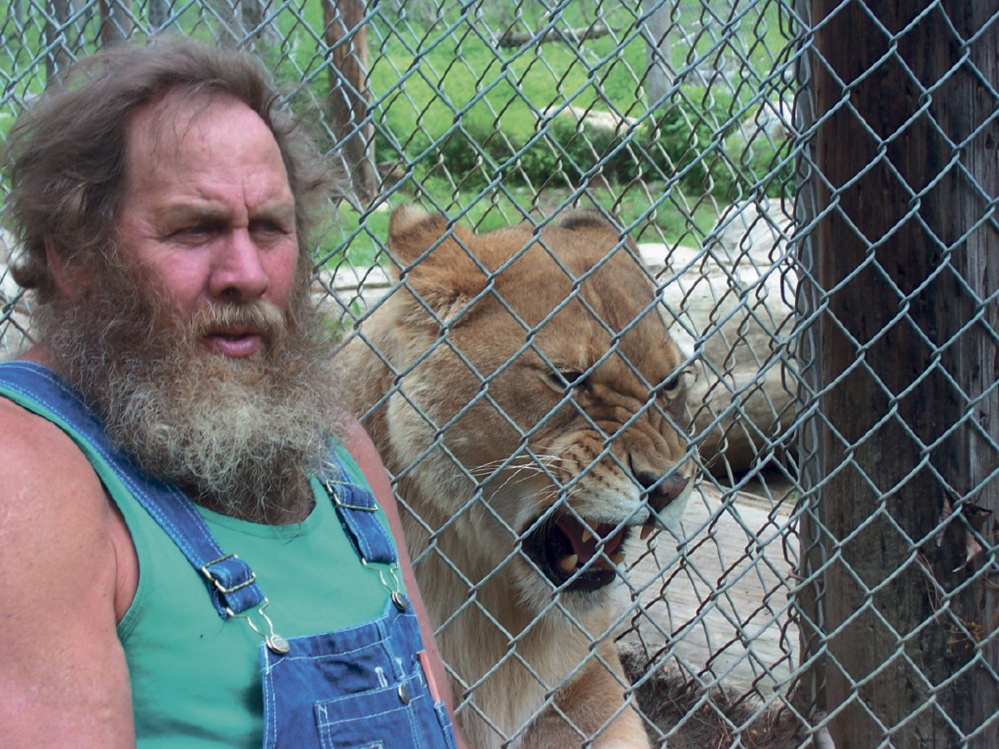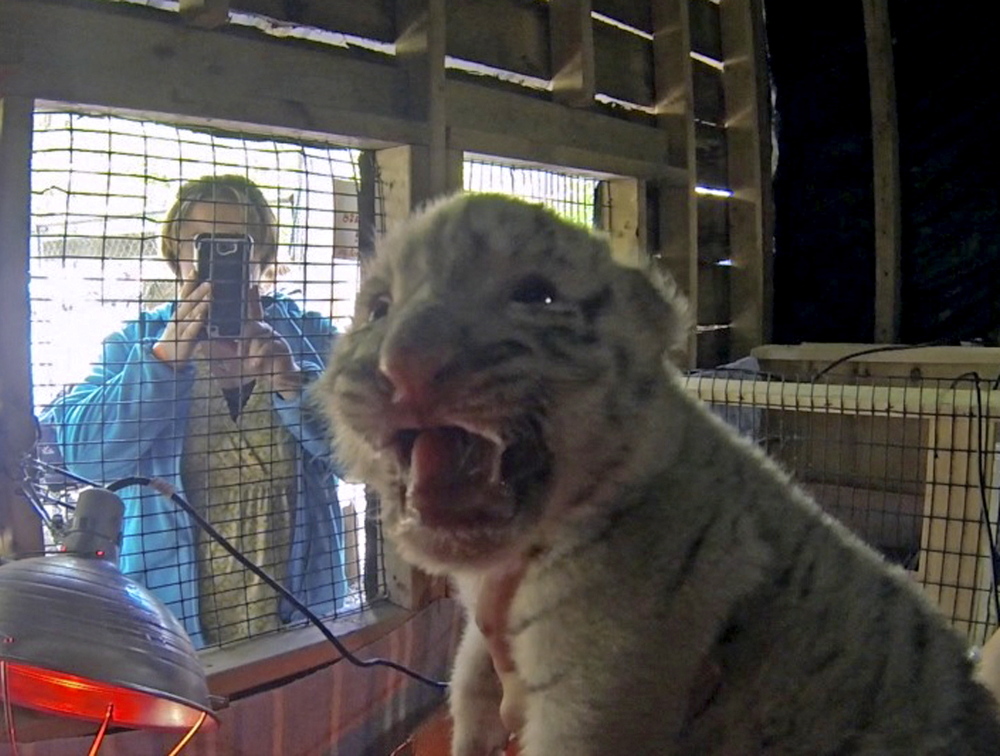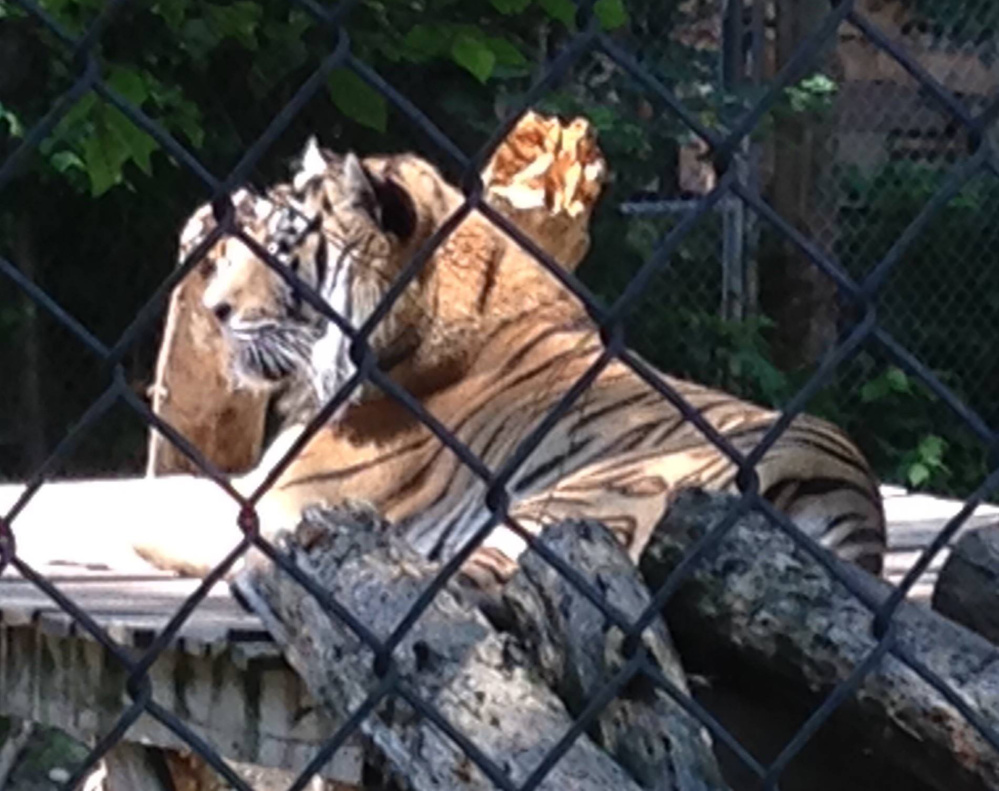WATERVILLE — Railroad Square Cinema will not show a documentary about DEW Haven animal sanctuary that was scheduled for next week after an investigation by a national political magazine raised questions about animal welfare violations at the sanctuary.
“Wild Home” originally was slated to play next Monday at Railroad Square, and owners Bob and Julie Miner and filmmaker Jack Schurman were scheduled to appear for a question-and-answer session at the theater. The showing was canceled Monday.
National left-leaning magazine Mother Jones alleged in an article Friday that DEW failed to comply with basic animal welfare rules dating back to the early 1990s.
“I don’t know whether those allegations are true or not,” Ken Eisen, programming director for the theater, said Tuesday. “It’s not something I’m in a position to investigate, but we thought it should have been brought to our attention before we booked the film.
“Given the fact that we didn’t have that information, we were not comfortable with the truth of it. We thought the better thing would be to cancel the showing.”
Meanwhile, Schurman, who grew up in Brunswick and West Forks, said he was disappointed to learn that the screening of “Wild Home” had been canceled in Waterville, as well as at the Frontier Cinema in Brunswick, where the film had been scheduled to play Sunday.
In an interview Tuesday, he called the article in Mother Jones “horrendous” and criticized it for bringing up violations at DEW Haven that were either minor or dated to several years ago.
“The most specifics they had was bringing endangered animals across state lines without a permit, which again, was like 14 years ago, before they knew, and then they got the permit after,” said Schurman, 31.
Schurman and his brother Robert first met the Miners in 2008 after their mother mentioned DEW Haven to them. They spent six years filming at the Mount Vernon sanctuary and “never saw anything but well-cared-for animals,” Schurman said.
“Wild Home” premiered at the Camden International Film Festival in 2014, where it won the festival’s audience award.
According to Schurman, the film is a character study of Bob Miner, a Vietnam veteran who, with his wife, started the animal sanctuary in 1980 on their property in Mount Vernon. There are references to some of the violations mentioned in the Mother Jones article, but Schurman said they are intentionally not the focus of the film.
“It’s really just a character study of Bob. It’s not really in support of or against animal sanctuaries or refuges. It’s more about a character study of him, what he’s been through in his life,” Schurman said.
The film is in no way associated with the Miners’ Animal Planet television show, “Yankee Jungle,” which was canceled by the television network after Mother Jones presented its findings to Animal Planet in January.
As part of the investigation, the magazine cited dozens of reports from the USDA and the Maine Department of Inland Fisheries and Wildlife released after Freedom of Access requests.
The reports, many of which were included as primary documents with the article online, alleged that the Miners had illegally imported animals into Maine and that they failed to comply with the federal Animal Welfare Act through violations related to poor sanitation, unhealthy feed and improper enclosures.
The article also said that according to USDA reports, the Miners failed at times to provide proper veterinary care for animals, and that they have admitted to collecting road kill and carcases to feed to the animals at the sanctuary, possibly leading to unsanitary conditions.
It also includes pictures of dead cows presented to the magazine as examples of the conditions at DEW Haven by a former volunteer at the facility.
The Miners have denied the photos were taken at DEW Haven, and Schurman said that they misrepresent the conditions.
“The pictures are either road kill or dead livestock from farms nearby that they use to feed the animals, which isn’t against violation or code at all, so I think those are terribly miscontextualized,” he said.
The decisions of both cinemas in Brunswick and Waterville were based at least in part on reactions from the communities to the article questioning the conditions at DEW Haven, employees said Tuesday.
“We have received protest about the film from members of our community,” said Michael Gilroy, owner of the Frontier Cinema in Brunswick, in an email. “The Mother Jones article was referenced as part of this protest. After reviewing all the material sent to us, and speaking with others, it was our opinion that we did not have enough information to bring this story and its controversy to our community in a responsible way.
“We are encouraging the filmmaker, those associated with the film and those protesting the film to create an environment for an open dialogue. Should a fruitful discussion take place regarding the film and its controversy, then we’ll revisit a screening, but at this time we don’t feel Frontier is the appropriate venue for this discussion.”
Railroad Square manager Allen Sanborn also said Tuesday that cinema had gotten calls and emails protesting the fact the documentary was scheduled to be shown. After the show was canceled and an article appeared on centralmaine.com about it, Sanborn said they also got calls from people who were upset the film would not be shown.
James Parker, a retired wildlife ecologist and former professor at the University of Maine at Farmington, was one person who contacted Railroad Square Cinema, imploring them not to show the film.
“There’s nothing wild about the place. It’s a prison camp for animals,” Parker said in an interview Tuesday, adding that he has visited DEW several times and has specific concerns about how animals there are treated. Parker said he objects to exotic animals being kept in captivity in almost all scenarios, since in his opinion the United States does not have adequate laws to regulate the care of exotic animals and there are few facilities equipped to keep and care for non-native species of animals.
He called the Mother Jones article “solid, well-vetted and accurate” and applauded the decision of Railroad Square to cancel its screening of “Wild Home.”
Meanwhile, some residents reacted negatively to the news that the cinema would cancel its screening of the film.
Tammy Sheehan, of Belgrade, a volunteer at DEW Haven since last year, said she was disappointed Tuesday to hear the film had been canceled, as she had been hoping to go see it.
“I know how the animals are taken care of and I know how Bob and Julie are, and the animals do come first,” said Sheehan, 46. “I take offense when they say they’re abusing the animals and not cleaning them, because I go out there and I do that.”
Sheehan said she didn’t have information on the conditions at DEW Haven before last year, but said she wasn’t bothered by the reports cited in the Mother Jones article, many of which date to the early 2000s or before.
“Anything that was on there Bob and Julie fixed and they fixed it above and beyond what was required of them. How long do you hold that over somebody’s head?” she said.
In a Facebook post Saturday, Julie Miner also refuted the allegations against DEW Haven, saying that the animals at the sanctuary have never been abused or mistreated.
“Every day, 365 days a year, we talk about how we can improve their lives here,” Miner wrote. “We educate the public on each and every one of them. Not just the tigers, but the goats and chickens too. Each animal in this world has a place and an importance.”
Eisen said Tuesday that he couldn’t think of another film that Railroad Square has decided at the last minute not to show.
“The fact that we show a film doesn’t necessarily mean we endorse the views, or opinions or anything, of the subjects of a film or the filmmakers, merely that we think it’s worthwhile showing for one reason or another,” he said. Decisions on what films to show are usually based on artistic value, commercial viability and, as in the case of Wild Home, local interest, Eisen said.
“Of course it still has local interest, but if it’s not telling the truth about the subjects, or if that possibility is there, then I think the aesthetic value of the film becomes very compromised,” Eisen said. “It’s a documentary. It’s supposed to be, to some extent, a truthful portrayal of the subject.”
Meanwhile, Schurman said he doesn’t blame the cinemas for deciding not to screen “Wild Home,” but he is disappointed. He said the film has never generated controversy in the past and that he wouldn’t mind if protesters showed up, although he doesn’t think they should be concerned with conditions at DEW.
“I’m really bummed,” he said. “It’s too bad people won’t get to see the film, because I’m really proud of it. It’s my favorite thing I’ve ever worked on. I worked on it with my brother, all our friends from Maine worked on it, and we just want people to see it.”
Rachel Ohm — 612-2368
Twitter: @rachel_ohm
Copy the Story LinkSend questions/comments to the editors.






Success. Please wait for the page to reload. If the page does not reload within 5 seconds, please refresh the page.
Enter your email and password to access comments.
Hi, to comment on stories you must . This profile is in addition to your subscription and website login.
Already have a commenting profile? .
Invalid username/password.
Please check your email to confirm and complete your registration.
Only subscribers are eligible to post comments. Please subscribe or login first for digital access. Here’s why.
Use the form below to reset your password. When you've submitted your account email, we will send an email with a reset code.